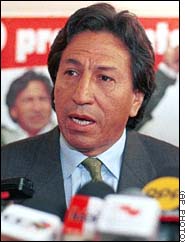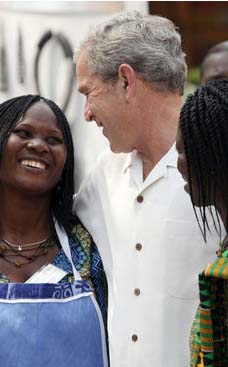
Toledo's own education reflects his poverty ideals. As a young man in Peru in the 1960s, Toledo met Joel Meister, professor emeritus for the UA's public health college. Meister was working with the U.S. Peace Corps. and befriended Toledo. Meister and his wife Nancy, an oncology social worker at the Arizona Cancer Center, then helped Toledo gain admission into the University of San Francisco, Meister said. Alejandro Toledo grew up in Chimbote and was befriended by Peace Corps Volunteers who helped him study in the United States. Later he was a language instructor in Brockport's Peace Corps/College Degree Program. Elected President of Peru in 2000, Toledo invited the Peace Corps to return to Peru after a 27 year absence. He is presently a visiting Fellow at Stanford University.
Former Peruvian president Alejandro Toledo pontificates on poverty
Former Peruvian president pontificates on poverty
By: Shain Bergan
Issue date: 4/18/08 Section: News
More than 200 people packed into McClelland Hall to listen to the former president of Peru speak about ways to alleviate poverty.
Alejandro Toledo, the Peruvian president from 2001 to 2006, spoke about the economic troubles of the world and how he addressed such problems in his home country.
Although Toledo has given countless speeches over his years as a candidate and president, this one was possibly the most difficult, since its message was so close to his heart, Toledo said.
As an indigenous Peruvian living in poverty, he began working two jobs at the age of six to provide his family with supplemental income. His experiences growing up in poverty allowed Toledo to effectively address such issues when he entered political office, he said.
"I escaped poverty. Now I'm free," Toledo said. "I'm not fighting for myself."
Peru's own struggles to deal with growing levels of poverty can be used as a comparison to fix economic problems in the United States.
As he adjusts to life outside of the presidency, Toledo preaches the importance of an active democracy in decreasing poverty, he said.
"Democracy is more than just going to vote on Election Day," Toledo said. "If that's democracy, I don't want any part of it."
Instead, governments should activate programs aimed toward providing the poor with skills in demand. A major part of this plan is developing a superior education system, he said.
"You are only free when you have the capacity to choose," Toledo said. "I am free because of education."
Toledo's own education reflects his poverty ideals. As a young man in Peru in the 1960s, Toledo met Joel Meister, professor emeritus for the UA's public health college. Meister was working with the U.S. Peace Corps. and befriended Toledo. Meister and his wife Nancy, an oncology social worker at the Arizona Cancer Center, then helped Toledo gain admission into the University of San Francisco, Meister said.
The U.S. and Peruvian economies are comparable in their poverty problems in that both nations have a high inequality of income. Since middle and working class families are struggling to get by each year while wealthy individuals continue to control the bulk of finances, the U.S. must develop programs that result in lower class families receiving more income. The idea is similar to Toledo's own, an approach that helped Peru close the income gap over the course of Toledo's presidency, Meister said.
Toledo's advice can be used as more than just an economic guide for students after they graduate, said Raul Saba, associate director of the UA's Center for Latin American studies.
The center is using the same approach to encourage students to study abroad in hopes that such interaction will help to create international internship opportunities, a rare commodity in Peru, he said.
"It takes sacrifice and risk," Saba said. "But in the end, it's worth it."
Toledo's speech was a fresh way to get UA students and staff interested in solving the problems of the economies around the world, said Takara Tatum, a history sophomore.
"It makes you more aware of what else is going on in the world," she said.
Redistribution of the inequality gap is just part of the solution. The economy must grow by creating global relationships and business opportunities without becoming independent on foreign markets and prices, Toledo said.
"If the economy doesn't grow, there is nothing to redistribute," he said. "Countries need leaders, not politicians."








